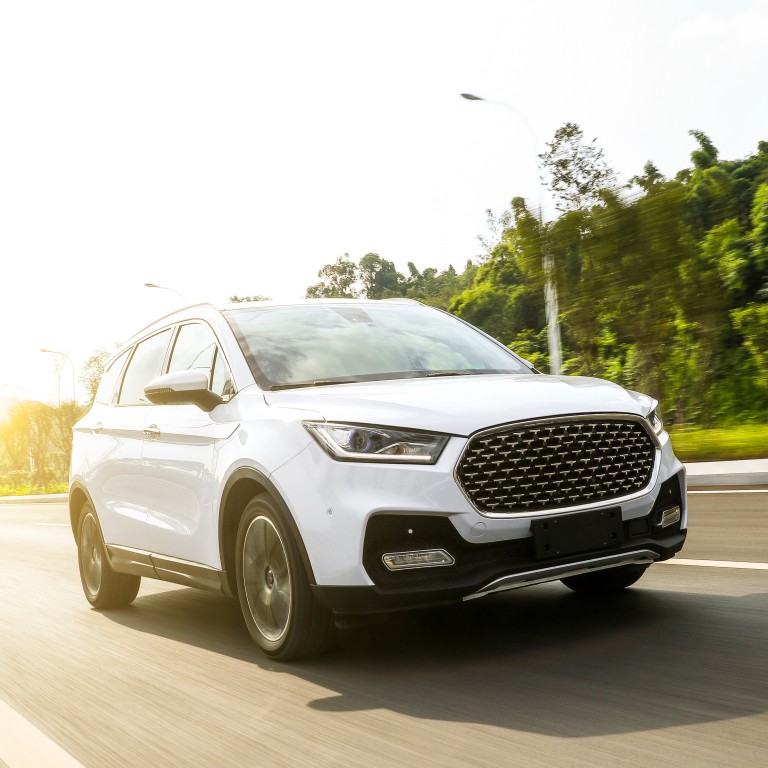
Letters | SUVs are a road hazard, electric or not
- Readers discuss the safety of sport-utility vehicles, international football matches in Hong Kong, and one way to begin to resolve the comfort women issue
This plan to launch electric sport-utility vehicles in Hong Kong to “stay on top of the competition” is disheartening. SUVs, usually targeted at those keen to live the weekend dream of an off-road, outdoor lifestyle, simply do not seem suitable in a densely built-up and congested environment.
Road-hogging SUVs are not just more power-hungry than smaller cars, studies also show they pose a greater danger on the roads. I have regularly observed SUV drivers exhibiting “big vehicle” selfishness – unwilling to slow down in busy traffic and yielding to the temptation to speed by deploying their turbocharged engines.
I was once harangued by an SUV driver while crossing a school road with the green light just starting its countdown. The woman stridently tooted her horn, nudged her car towards me threateningly and took both hands off the wheel to enable middle-finger salutes.
Even the best SUV drivers could be hindered by the high sight lines. When you cannot see the toddler behind you while backing out of the driveway, tragedy is imminent. SUVs’ elevated headlights could also blind oncoming drivers. And with their large bodies, SUVs can’t easily swerve to avoid clipping cyclists. They often roar past me in the bike lane with only a hair’s breadth of separation.
According to a study, the tendency of SUVs to sport “bull bars” greatly increases the chances of a fatal collision with a pedestrian at much lower speeds.
Surely the introduction of more SUVs to Hong Kong compromises urban road safety?
To mitigate the greater road dangers that SUVs bring, there should be speed-limiting technology under the bonnet of every new SUV. SUVs should also be forced to adhere to lower speed limits. These measures, for a start, will ensure road risks are shared more fairly.
Joseph Ting, Brisbane, Australia
The more international football matches the merrier
I remember how going to Hong Kong Stadium was a big deal. In 2000, I was there when Japan, the Czech Republic and Mexico played the Lunar New Year Cup.
These days, the Lunar New Year Cup is a club-level tournament. In 2018, it was played between the Hong Kong team and the Hong Kong League XI.
If it is really hard to invite top foreign clubs and national teams to play in Hong Kong, what about teams from mainland China, South Korea or Japan? International matches are good for players, and great entertainment for Hongkongers young and old.
Tony Cheung, Kennedy Town
Open discussion needed to resolve the comfort women issue
The comfort women issue remains a source of conflict between Japan and its erstwhile colony Korea. Although Tokyo and Seoul reached a settlement in 2015, it is no longer being implemented.
What can be done to end this decades-old quarrel? One solution is to encourage open discussion in South Korea.
Park had to redact 34 sections from her book, after a lower court partly accepted the plaintiffs’ request for a sales ban. In 2017, the same court acquitted her on defamation charges, but an appeal court overturned the acquittal and fined her 10 million won.
Similarly, Lew Seok-choon, a former Yonsei University sociologist, was indicted in 2020 over a lecture at which he said comfort women were, to some degree, prostitutes.
I believe it’s time South Korea broke the long-held taboo and welcomed fresh perspectives on the issue. The purpose of encouraging open discussion isn’t to trivialise the tragic experiences of comfort women or to provide platforms for extreme views.
Rather, it’s the most effective method of understanding a complex historical problem and weeding out misinformation. An inclusive and open dialogue, including the consideration of controversial ideas, is the key to finding realistic and feasible solutions. Coercive measures will only stifle progress.
Kenji Yoshida, Seoul

